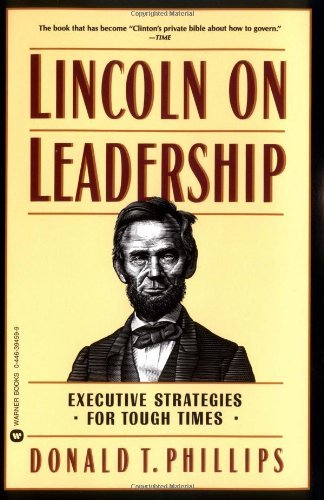Lincoln on Leadership Book Summary
Executive Strategies for Tough Times
TL;DR
In 'Lincoln on Leadership,' Donald T. Phillips explores Abraham Lincoln's leadership strategies during turbulent times, offering practical insights for contemporary leaders to navigate their own challenges effectively.
What is Lincoln on Leadership about
'Lincoln on Leadership' delves into the leadership principles and practices of Abraham Lincoln, particularly during the unprecedented crises of his presidency. Written by Donald T. Phillips, the book draws on Lincoln's remarkable ability to unite a fractured nation and lead through adversity. It highlights key strategies such as maintaining initiative, fostering open communication, and encouraging risk-taking in organizations. Phillips provides a framework for understanding Lincoln's interpersonal skills, decision-making, and adaptability that remains relevant in today’s complex leadership landscape.
Lincoln on Leadership 8 Key Takeaways
Seize the initiative.
Lincoln believed in taking decisive action and maintaining control of situations rather than waiting for circumstances to dictate outcomes.
Wage only one war at a time.
Focusing efforts on one challenge helps to ensure that resources and attention are not spread too thin, leading to more effective management.
Encourage risk-taking while providing job security.
Leaders should create an environment where employees feel safe to innovate, while also ensuring their job stability.
Request and suggest rather than order.
Lincoln's approach emphasized persuasion over coercion, fostering a more collaborative and respectful work environment.
Build strong relationships with colleagues.
Establishing trust and open communication channels among team members is crucial for effective teamwork and organizational success.
Know your people.
Understanding the strengths and weaknesses of team members is essential for effective delegation and leadership.
Be accessible.
Creating an environment where employees feel comfortable approaching their leaders promotes transparency and open dialogue.
Avoid pettiness in leadership.
A leader's attitude sets the tone for the organization; positivity fosters a similar mindset among subordinates.
Top Lincoln on Leadership Quotes
- "If the leader is petty, the subordinates will be petty. But if the leader is encouraging, optimistic, and courteous, then the vast majority of the workers in the organization will be as well."
- "Know your people; build strong alliances and persuade rather than coerce."
Who should read Lincoln on Leadership?
This book is ideal for current and aspiring leaders, managers, and anyone interested in the principles of effective leadership. Readers will gain valuable insights into how to inspire and lead teams, particularly during challenging times, by learning from Lincoln's exemplary practices.
Lincoln on Leadership Best Reviews
- "Donald Phillips offers a compelling examination of Lincoln's leadership style that is rich with wisdom and practical advice for today's leaders." - The New York Times
- "A must-read for anyone seeking to improve their leadership skills by learning from one of America's greatest presidents." - Leadership Journal
People also liked these summaries
Lincoln on Leadership FAQs
What are some key principles of leadership according to Lincoln?
Lincoln emphasized the importance of knowing your people, building strong alliances, and persuading rather than coercing, which are still relevant leadership methods today.
What is the primary focus of the first part of 'Lincoln on Leadership'?
The first part focuses on the importance of accessibility and creating an environment for open communication, highlighting the need for strong relationships among colleagues.
When was 'Lincoln on Leadership' published?
The book was published in 1992 by Donald T. Phillips.
